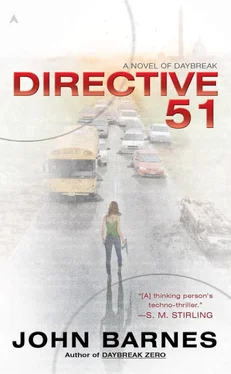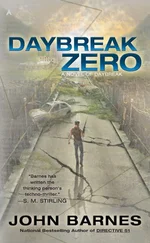When he went inside, Karl said, “Look what I have here.” He pointed to the microscope.
In the circle of bright light, the surface of the string showed as a pitted moonscape; as Robert watched, small square bodies crept along the surface, coming and going to the end, where a spiderlike cluster of squares sat like a nest. “They’re sort of like ants,” Karl explained. “The little square things carve trails in the aluminum as they go along, loading it onto themselves; then when they’re full, they crawl backwards along their trails to find the breeding ball.”
“Breeding ball?”
“That’s what I’m going to call it. It’s a huge knot of square things, maybe a few thousand of them, that dark dot at the end of the aluminum thread, and it appears to be making more square things out of aluminum and, I don’t know, carbon and oxygen from the air, maybe. It keeps making more of them and sending more of them out. Whenever they come back, they deposit the aluminum between the breeding ball and the main piece of aluminum. Then they go out and mine more. Somehow they know not to touch aluminum that was laid down by other square things. So over time they keep building up aluminum under the breeding ball, and that becomes the thread we see, and gradually the aluminum gets turned into square things. I’m betting if you take a square thing and put it on aluminum by itself, it will start a breeding ball, and then start sending out more square things to feed it—”
“Karl,” Robert said. “It’s all right. I know.”
The old guy looked like a flabbergasted Santa Claus.
“I was only at the car five minutes,” Robert said. “You couldn’t possibly have learned that much by looking at them under a microscope in that short a time. And every ‘guess’ you made this morning was dead right. And somehow, when you split the sample to send to Indy, you knew to keep the breeding ball for your side of the sample, and probably what you sent them is just a piece of crumbly aluminum wire, right? By the way, the underside of the truck is being eaten by your square things—you’ve got a couple foot-long threads on the muffler—so I’m guessing it won’t be more than a couple days before the nanoswarm gnaw through to something important.”
Karl smiled ever so slightly, as if he were just about to share the punchline of the best joke in the world. “I guess I’m like everyone else. I underestimate you because you don’t chatter much.”
“Probably. So… how’d you get into Daybreak, Karl?”
“Depends on why you want to know. You going to turn me in?”
Robert hadn’t thought that far. He shrugged and looked around at the cabin; cast-iron, wood-fired, basically 1850s technology, and stocked for a long haul. “You like it quiet too,” he said.
“Well, except for the sound of my own voice. And I like music now and then, acoustic and live. Part of why I recruited a banjo player.”
Robert thought for a few long moments, hard. Back in town he had some clothes, some old porn he hardly bothered with anymore, and some household stuff.
Out here, there was a reasonably comfortable life in the woods—and more quiet than he’d ever encountered before.
“I’m just sad,” Robert told Karl, “that you didn’t invite me in on it. Did you make those little square things yourself?”
“Me, and a couple grad students at Purdue, and one old hobby programmer down in Kentucky, but yeah, they were my idea, sort of; got the idea from a real old poem, by Stephen Vincent Benet.”
“It would’ve been fun to work on them with you. But I think we’ll have a pretty good time out here, anyway. I like quiet.”
Karl stuck out his hand, and Robert shook it, and that was all the more either of them ever said about Daybreak again.
TWENTY MINUTES LATER. SAN DIEGO. ABOUT 7:00 A.M. PST. TUESDAY. OCTOBER 29.
Bambi Castro slept well on the plane, as she always did, and woke just as the plane descended over San Diego’s gorgeous harbor, crowded with warships, with the pleasure craft of the rich, with cruise ships giving the middle class a taste of luxury, the occasional freighter, the swarm of commercial fishing boats… she’d been away too long, hell, it was always too long. Any excuse to go almost anywhere on the coast south of LA was always welcome, but Bambi had grown up in a big house on the hills, within sight of the harbor, and besides being beautiful, San Diego was home.
The fates were on her side, and she sailed through the rental-car process and was on the highway, heading north, in no time. Locally, the FBI was in an office park up on the mesa to the north. The road rose through the sort of craggy rock, distant sea, and scattered palm, sage, and pine landscape that makes visitors say, Now, this is California . She had her iScribe talking through the car’s sound system, reading her all the stuff Arnie Yang and his team had put together overnight.
A message from David Carlucci, the local FBI chief, said that Ysabel Roth had arrived in Tijuana in a Mexican Army APC—the last running vehicle from the convoy she’d started out in, the others having succumbed to brown and green saline gunk, tentatively identified as soluble chlorides, around their wiring and electronics. A helicopter—carefully wiped down and sprayed with oil internally—had been dispatched to pick Roth up, and would bring her into Montgomery Airfield, near the FBI office, within an hour and a half.
Bambi’s rental car was a nice little Chrysler sedan that handled well on the big, swooping curves of the California four-lane that Bambi had thought must be the best driving in the world when she had learned on it. Since then she had driven on four continents, and now she knew it was the best driving in the world.
No one else out on Aero Drive, perfect weather, beautiful day, and an immensely important case in front of her; it was enough to make her heart sing over the drone of Arnie talking about the affinity group structure resembling New Age book discussions and political activist “flash demo” response nets. She should be more serious, but… well. Look at this morning! For the pure pleasure of it, she swooped across the empty lanes, over to the righthand lane, and downshifted to swing back.
The car pulled hard to the right, toward the rocky wall beyond the shoulder; she heard the harsh scream of a wheel motor loaded far beyond capacity. She fought the wheel, trying to pull the nose back to the left, into her lane.
A loud boom shook the car; she spun out, broadside to the lanes. The four motors de-synched, and the rear passenger-side motor went out completely; she fought for control as the electronic differential tried to counter-spin so hard that she thought the car might roll. It bucked and jolted, and the engine clamped and died as the generator failed to disengage.
Unfortunately, there was still plenty of power in the batteries and capacitors. The car slid backward into the oncoming lane.
Bambi jammed on the brakes to regain control; the ABS shuddered and the car vibrated with the regeneration moans in the remaining motors. The little Chrysler finally stopped sideways on the wrong side of the road, and then leaped about fifteen feet backward, impelled by the front motors, as some electronic control fired too late or at random. The rear bumper slammed into the guardrail so hard that the trunk flew open. She yanked the key to cut the power, slammed on the parking brake, and jumped out, afraid that the car might head over the brink and down the steep slope.
The car held still, but there were arcs and sputters—the quick-acceleration capacitors must be breaching. She clicked the key control, and the hood flipped open. The heavy emergency discharge cable, like a fat black rubber snake, with two thick insulated handles at its neck, flopped onto the pavement. Carefully, she took it by the handles and looked around for a ground post.
Читать дальше












